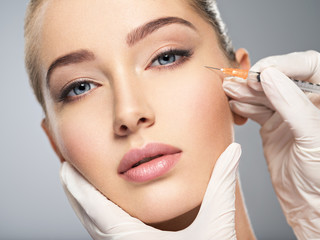 Botox injections are a great way to reduce the appearance of fine lines and wrinkles on the face. The injections can be performed anytime from now until your late 70s. They will also improve the look of facial muscles. If you’re considering getting botox, these are some of the things you should know before your appointment.
Botox injections are a great way to reduce the appearance of fine lines and wrinkles on the face. The injections can be performed anytime from now until your late 70s. They will also improve the look of facial muscles. If you’re considering getting botox, these are some of the things you should know before your appointment.
Botox treatments are a safe and effective way to improve the appearance of facial wrinkles. They are also an effective way to prevent chronic migraines, excessive sweating, cervical dystonia, spasticity, and eye muscle disorders. Botox injections are made from a chemical called botulinum toxin, which blocks nerve activity in muscles. The treatment usually lasts between three and 12 weeks, depending on your body’s response to the treatment.
Botox injections are also used to treat several other conditions. These include cervical dystonia, which is a neurological condition characterized by neck muscle contractions. They are also used to treat bladder dysfunction and hyperhidrosis, two common conditions that result in excessive sweating. The treatment has also shown promise for the treatment of migraines and overactive bladder.
Botox treatment is typically performed in a doctor’s office. The procedure is painless and usually takes just a few minutes. Botox treatments do not require anesthesia or recovery time, and the results are visible within a few days of treatment. Most patients experience no lasting side effects, but some may experience temporary weakness of the arm or leg.
Botox injections are an effective way to reduce facial wrinkles. The drug works by blocking nerve signals to the muscles. It was approved by the FDA for use in treating frown lines in the early 2000s. Aside from treating wrinkles, Botox treatment is also used to treat other health conditions, including eyelid spasms.
People who are over 18 years of age and are not pregnant can undergo Botox treatments. However, pregnant women should avoid Botox injections. As with any medical treatment, physical health is important. Those with certain medical conditions, including neuromuscular disease, should discuss Botox treatments with a doctor before opting for treatment.
Botox is a prescription medication that is administered by injection. It can interact with other medicines, including herbal preparations and supplements. This medicine may be harmful to people who are pregnant or breastfeeding. It can also interact with other medical procedures. Before you get Botox, talk to your healthcare provider about the risks and benefits of the procedure.
The most common Botox side effects are swelling and bruising. The toxin can also cause allergic reactions. These reactions may include wheezing, itching, difficulty breathing, swelling of the lips or tongue, and even a rash. These effects can be serious and, in some cases, even life-threatening. Other side effects include headache, dry mouth, and droopy eyelids.
Botox injections may cause bruising and mild pain. If you experience bruising or other severe side effects, talk to your doctor. Mild bruising will typically go away within a few days, although it may last for up to a week. In addition to swelling and bruising, Botox injections can cause a mild headache that lasts for several days or weeks. If these side effects occur, make sure to follow your doctor’s instructions about blood thinners and supplements.
Another Botox side effect that may cause problems is an upper respiratory infection. If you suffer from multiple sclerosis or diabetes, Botox injections may cause you to have an itchy or painful throat. Your doctor may prescribe muscle relaxants if you experience these side effects. While most cases of botox side effects are mild and transient, you should consider this before getting Botox.
Botox can be used to treat overactive bladder and severe underarm sweating. It is also used in preventing spasticity and treating chronic migraines. It can also help with urinary leakage caused by an overactive bladder.
Botox recovery time is not a significant concern for most patients. Most people are able to resume their normal daily activities within a few days of the treatment. However, if you have any underlying medical conditions, it is important to discuss these with your plastic surgeon before making an appointment. You will also need to avoid strenuous activity for the first few days.
The average number of units used for a Botox cosmetic treatment is between seven and ten days. However, the recovery time can be shorter or longer, depending on the strength of your muscles. Additionally, you are advised not to rub your face for four hours following the injection. You should also avoid aspirin and other blood-thinning medications, as these can cause bruising.
